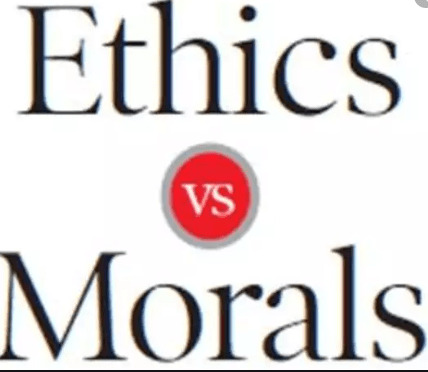Ethics vs Morals


Ethics and morals are two fundamental terms with respect to philosophy, so much so that their studies represent the most important reflections on the philosophy of Aristotle, Plato, and others of the most important thinkers.
Ethics: Although its concepts can be confused on many occasions, formally the definition of ethics corresponds to the branch of philosophy that tries to study and explain the rationale and founded origins of the social rules that govern people’s acts without the need for coercion. legal.
Moral: On the other hand, morality is the set of those guidelines that seem basic for coexistence in society and that guide the individual, as was said, beyond the regulations that the State imposes.
See also: Examples of Morality
Ethics Vs Normals
The difference between these two concepts is somewhat complex since in a way they represent the same but from opposite angles.
While ethics is intended as the formal and logical deduction of the causes of certain guidelines, morality involves the acquisition and repetition of habits in the behavior of individuals without previously having made any judgment about them, beyond the obligation to fulfill them.
The reflection on the moral is ethical, and in some cases invited to make a change when it is considered that the grounds or social conventions in which these behaviors, seemingly good, actually lack greater sense are based.
It may interest you: What are the Moral Trials?
Ethics and morals in a time
Once accepted the fact that morality is a group of behavior patterns, while ethics is a branch of philosophical study, it does not seem strange to consider that their stories and developments in time have had to be different.
Morality advanced in time in parallel with the most important consensuses on which the societies of before were founded. First, through religion, then through politics and science.
At present, when the advances of the first two seem to have stopped (in religion, accepting the diversity of creeds, and in politics, consolidating the democratic system), scientific morality is the one that arouses the greatest controversy, and many are the studies and research referred to it.
The history of ethics, on the other hand, had a more formal evolution and was discussed with different results in Ancient Greece, in the Middle Ages, in the Modern Age, and in the Contemporary Age. The current affairs of ethics invite diverse studies, be it in academic fields as well as in politics, education, or the family.
Ethics and morals Examples
Here is a list of examples of ethics ( 1 to 10 ) and morality ( 11 to 20 ):
- Ethics of duty
- Discourse ethics
- Medical ethics
- Buddhist ethics
- Normative ethics
- Bioethics
- Military ethics
- Professional deontology
- Ethics of virtue
- Economic ethics
- Refund if you mistakenly took something that is not yours.
- Notify the other if they are wrong and they charge us less.
- Returning the things that one sees falling to another person on the street.
- Exercise the public function honestly, and reject any attempt at corruption.
- Wear clothes on the street.
- Do not cheat when you are playing a sport.
- Do not take advantage of a child’s innocence, in any order.
- Not taking advantage of the physical difficulty of an old man.
- Do not cause suffering to an animal.
- Accompany the sick person.
More information?
- Examples of Trials
- Examples of Moral Trials
- Examples of Moral Norms
- Examples of Social Norms